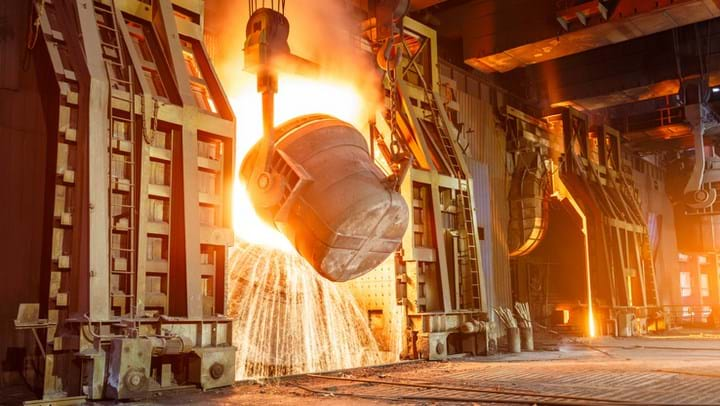Tata Steel puts 2,800 jobs at risk with Port Talbot blast furnace closures

INDIAN-OWNED Tata Steel has confirmed plans to close two of the UK’s few remaining blast furnaces in what has been described as a “devastating” decision for the country’s steel industry. The jobs of up to 2,800 UK workers are now at risk as the company moves to decarbonise its Port Talbot site in Wales.
Around 2,500 roles will be impacted in the next 18 months, says Tata, with a further 300 roles to be affected in the next three years. BBC News clarified that the first losses will come in April, with most set to go by September.
In the wake of rumours ahead of the official announcement, Rishi Sunak, the prime minister, said the UK government was “absolutely committed to steelmaking”. He noted that its £500m (US$634m) backing prevented the loss of all Tata Steel UK’s 8,000 jobs.
Tata Steel has pledged its support to staff facing redundancy, offering a £130m support package including redundancy terms, skills training, community support programmes, and job-seeker initiatives. Along with the UK and Welsh governments it has also established a dedicated Transition Board to support potentially impacted employees, contractors, and their communities, with £100m funding for short-term support and long-term “economic regeneration”.
Mark Drakeford, first minister of Wales, said: “We will carry on working to protect the future of Welsh steel production and we will do all we can to support all those affected by today’s announcement.”
Shifting to green steel
Supported by the £500m from the UK government, Tata plans to invest £1.25bn to replace the two blast furnaces at Port Talbot with an electric arc furnace (EAF) for greener and less labour intensive steel production.
This will also see the site shift from primary steel production using iron ore, to secondary production relying on scrap and recycled metal. The switch would reduce the UK’s carbon emissions by around 1.5% (5m t/y), contributing to its transition to a greener economy. At the same time, the nation could be left at risk of losing all its primary steel production capacity as its only other blast furnace producer, British Steel, has also unveiled plans to replace its operations with electric arc furnaces.
September’s initial announcement of the proposed closures caused immediate concern for Tata Steel workers. Condemning the potential job losses, unions quickly joined up to develop an alternative plan, presented to Tata Steel, that would involve keeping one blast furnace operational through a transition period running at least until 2032. This would have cost Tata an additional £650m reports The Financial Times.
But Stephen Kinnock, Labour MP for Aberavon, which is home to the Port Talbot steelworks, warned that pursuing an electric arc furnace-only model as global demand for steel increased would be to the detriment of both Tata Steel and the UK. He urged both to “rethink their approach and recognise that an exciting prosperous future for British steelmaking can be found by adopting the multi-union plan”.
While the wider multi-union plan was rejected, Tata Steel did agree to part of the proposal, and will keep the site’s hot strip mill open to roll slab during the transition period.
The move is expected to safeguard around 200 jobs.
‘Tooth and nail’
Roy Rickhuss, general secretary of the trade union Community, called Tata’s decision to close the blast furnaces “unacceptable”.
He pushed for the multi-union plan, saying: “The decision to plough ahead with the bad deal for steel first announced in September would be devastating for Port Talbot and the wider steel industry, with Britain’s primary steelmaking capacity decimated and carbon emissions offshored to heavy polluting countries.
“It doesn’t have to be this way, and our credible multi-union plan lays out a better path to protect jobs, the economy, and our environment.”
Meanwhile, Unite’s general secretary Sharon Graham said ahead of the official announcement: “Unite will fight tooth and nail to defend steel workers and our steel industry…This is the time to defend British workers and communities, as well as our industrial base and our national security. More managed decline can only help the UK’s competitors – steel producers in other countries. Politicians need to make the right choices now or they will not be forgiven easily.”
Greenpeace, meanwhile, preferred to concentrate on an area where the government could have a positive impact, with policy director Doug Parr highlighting the shift many countries are making to green steel with hydrogen technology.
“Alongside the new electric arc furnaces, this is an option that could have saved jobs at Port Talbot and helped revitalise this industry but it's now a missed opportunity,” he said. “The global race to a low-carbon economy is on, and if the UK doesn't seize its chance to create those jobs here, they'll simply go somewhere else. We believe a better future for the workers, the economy, and the planet is possible – but both government and businesses need to get serious about it.”
Recent Editions
Catch up on the latest news, views and jobs from The Chemical Engineer. Below are the four latest issues. View a wider selection of the archive from within the Magazine section of this site.




